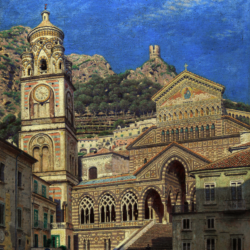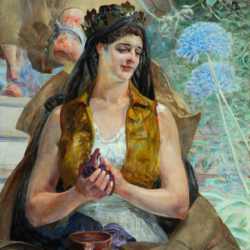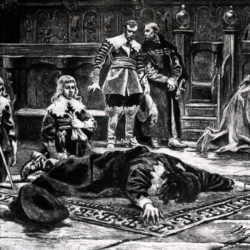
Against (political?) realism
Sienkiewicz opposes to the pure idea of Realpolitik or the rule of raison d’état which was ultimately planted in Polish minds in the 19th century. Polish political thought was forcibly pushed, as it were, into this train of thought as a result of the crime of the Partitions and the realization that such cynical politics was necessary if the ultimate goal was the regaining of independence in the brutal world of the modern powers. Rzegocki notes: “Thought that referred to the existence of God, Providence, the idea of justice or a universal normative order, from the perspective of modern realists was perceived as pitifully futile.”[1] Maurycy Mochnacki (a great admirer of Machiavelli), Michał Bobrzyński, as well as Dmowski, equally accused the Polish nation of puerility and pointless idealism. Sienkiewicz’s standpoint was beginning to take shape even as he disputed the theses of the Kraków school of history, conciliatory though his tone may still have been as he pointed to the third factor regulating the activity of the state. In his review of the work of Szujski (Historii polskiej ksiąg dwanaście, Polish history in twelve books), he observes:
From what the clearest supporters of the new school are saying it would seem that creating a strong state is what they consider the highest ideal to which societies should strive, and the ability to create – the most vital attribute; we seem to think, however, that between a state which for its rule of the state devours thousands of generations like Moloch and an impotent anarchy, there is a third way to be found, some kind of higher principle which history itself should balance.[2]
Furthermore, in the review of Bobrzyński’s work the writer makes an even stronger point of showing the terror of such a realistic, pragmatic view of the past based on power worship and state centralism: “There are maybe in such judgments that ruthless worship of power characteristic for some present-day German historians, but never mind.” The reviewer’s dilatation is again permeated by the belief in the Polish, individualistic third way of state which reconciles idealism, tolerance, and civic freedom:
What we mean is that had aspirations to create a stronger government existed in Poland, such as can most generally be seen in other countries, had these aspirations failed, they do not form the entirety of internal history as the third factor lies within them. That factor consists in aspiring to create not such a government or other as based on a Western model but an ingenerate, individualistic state system corresponding the most to the character and nature of the nation. And maybe the clashing of this current with the wanton individualism, on the one hand, and the pursuit of foreign enemies, on the other, engendered powerlessness and a moment of weakness which external circumstances turned into a fall.[3]
The defense of Polish history against the judgment of the Kraków historians bespeaks clearly of the belief that it is not power itself that is the goal of politics but the striving towards political order which is closest to the order deeply rooted in the aspirations of the Christian religion, even though theological issues do not arise yet during these Partitions. Those ideas were ushered into Polish politics by the beautiful declarations of the Union of Horodło on 2 October 1413 in which the worldly and temporal are strongly intertwined with the eternal and eschatological.
It is not impossible for Sienkiewicz’s thinking to have been influenced by, amongst others, Julian Klaczko who, according to Rzegocki, embodies the model of a political realist who does not abandon the idea of a moral order which began with God. The critique of modern governing mechanism often touched upon the example of Germany and especially the brutally pragmatic politics of Bismarck. Sienkiewicz openly alludes to Klaczko’s thought in his statement on Bismarck[4]:
All the ages of the Christian culture, no less than a sound mind, speak louder than the idolaters from Warcino that this culture which has been the life of humanity for two thousand years is – positively meant – a power even greater and something even more overwhelming than bayonets and that justice should be the commander of countless battalions.[5]
Przypisy
- A. Rzegocki, op. cit., p. 31.
- “Wiadomości bieżące” [Current affairs] (Gazeta Polska 1880, no. 52), in H. Sienkiewicz, Wiadomości bieżące [Current affairs], in Dzieła [Collected Works], vol. 52, p. 10; trans. K. C.
- “Wiadomości bieżące” [Current affairs] (Gazeta Polska 1880, no. 52), in H. Sienkiewicz, Wiadomości bieżące [Current affairs], in Dzieła [Collected Works], vol. 52, p. 52; trans. K. C.
- On his acquaintance with Klaczka, see M. Gloger, “Zaginiony pamiętnik Sienkiewicza. Rekonstrukcja” [Sienkiewicz’s lost journal: A reconstruction], in Sienkiewicz z innej strony [Sienkiewicz from another perspective], edited by J. Axer, T. Bujnicki, Warsaw 2015, pp. 45–46.
- “O Bismarcku” [On Bismark], in H. Sienkiewicz, Supplement 1, Dzieła [Collected Works], vol. 52, p. 120; trans. K. C.











